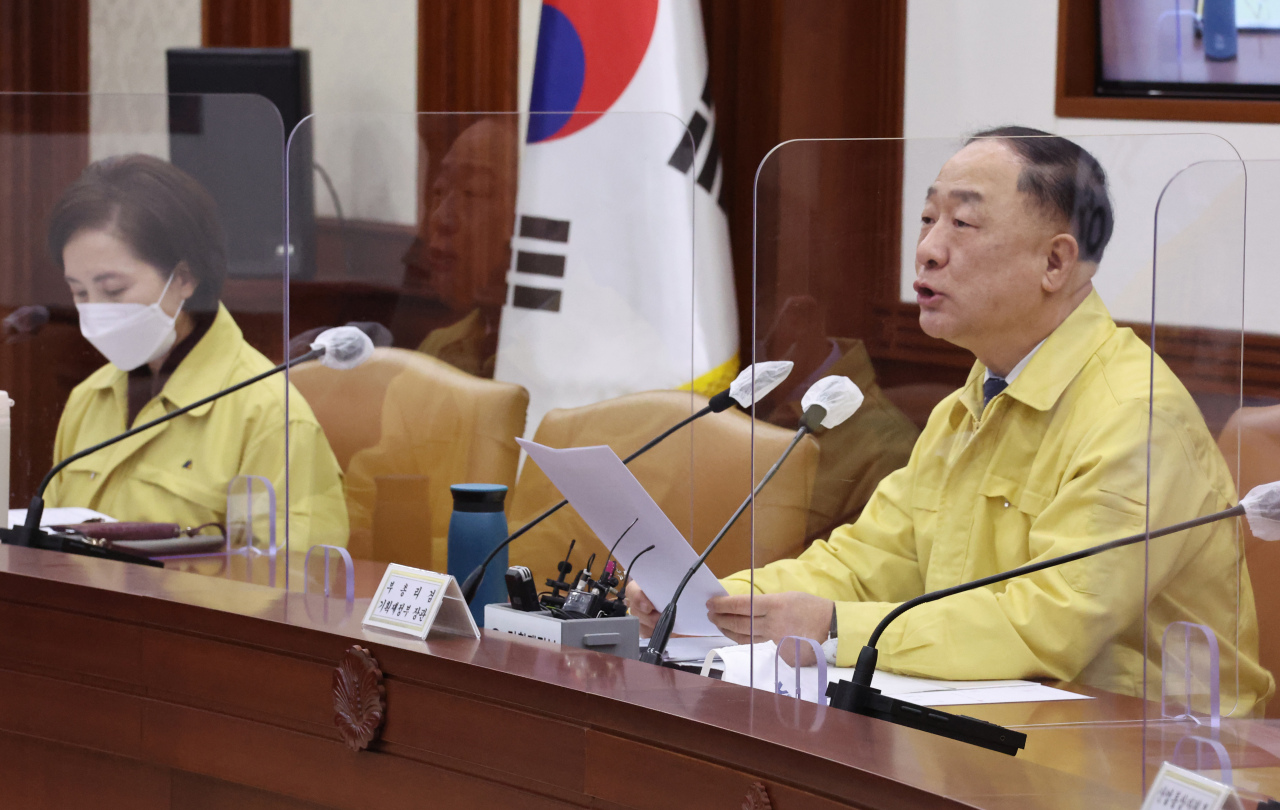 |
Finance Minister Hong Nam-ki (right) speaks during a ministerial meeting for economic policies at Government Complex Seoul, Thursday. (Yonhap) |
SEJONG -- The Finance Ministry will look into food prices in the market later this month to uncover whether there were irregular hikes in price tags via cartels, the nation’s top policymaker said Thursday.
The action comes amid continuous growth, over 3 percent on-year, in consumer prices for several months. Sharp price increases in agricultural and livestock products, alongside rising fuel prices, are putting a heavier burden on households.
In a meeting for economic policies in Seoul, Deputy Prime Minister and Finance Minister Hong Nam-ki said that “the government would not spare any effort to stabilize consumer prices in February.”
In particular, he stressed that the ministry, in coordination with the Fair Trade Commission, would bolster monitoring of the market to “block irregular or excessive price hikes of food products via possible means such as cartels (among retail marts or restaurants).”
Inflationary pressure is building up with international crude prices hovering at around $90 per barrel. The global supply of a variety of products has failed to meet local demand amid economic recovery, he said.
The Minister also said the government would take “detailed” countermeasures against rising prices by item, such as agricultural, fisheries and livestock products.
Alongside policies for stabilizing consumer prices, he picked economic risk management as one of the several core tasks during the first quarter, amid uncertainty from geopolitical risks involving Ukraine-Russia relations.
Hong said that policy coordination will be carried out during a meeting of chiefs from the Finance Ministry, the Financial Services Commission and the Bank of Korea, scheduled for this Friday.
“Among the main agenda items would be how to collaborate on fiscal, monetary and financial policies, ease financial imbalances, and stabilize the bond and foreign exchange markets,” he said.
He said the meeting would focus on discussing contingency plans to tackle the fallout from the potential deterioration in tensions between Ukraine and Russia.
Further, the nation’s benchmark gasoline price is poised to break the 1,700-won ($1.42) mark per liter, according to the Korea National Oil Corp. It reached 1,698.29 won on Thursday after rising for more than four consecutive weeks starting on Jan. 10.
In this situation, market attention is being focused on the Bank of Korea’s Monetary Policy Committee meeting slated for Feb. 24, where the benchmark interest rate would be set.
The benchmark interest rate, which touched an all-time low of 0.5 percent per annum between May 2020 and August 2021 due to the pandemic, has been set at 1.25 percent via recent hikes for three times by 25 basis points, respectively.
If the central bank chooses to raise the rate again by 25 basis points later this month, the rate would normalize to the same level in the third quarter of 2019 at 1.5 percent per annum.
By Kim Yon-se (
kys@heraldcorp.com)







![[Today’s K-pop] Blackpink’s Jennie, Lisa invited to Coachella as solo acts](http://res.heraldm.com/phpwas/restmb_idxmake.php?idx=644&simg=/content/image/2024/11/21/20241121050099_0.jpg)
